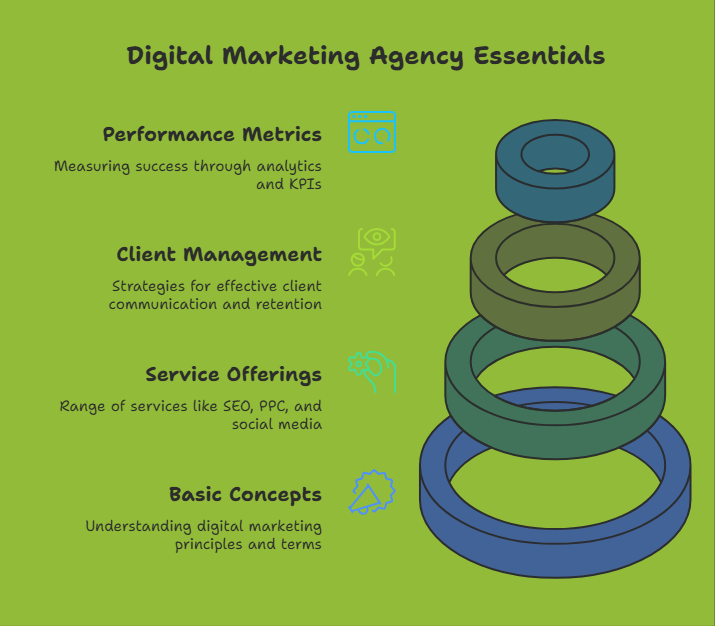I hope you enjoy reading this blog post.
If you want to get more traffic, Contact Us

Click Here - Free 30-Minute Strategy Session
Be quick! FREE spots are almost gone for this Month. Free Quote

Digital marketing encompasses various strategies aimed at promoting products, services, or brands through online channels. It leverages digital platforms such as social media, search engines, email, and websites to target specific audiences. Businesses utilise techniques like search engine optimisation (SEO), pay-per-click (PPC) advertising, and content marketing to increase visibility and engagement.
Key components include:

Click Here – Free 30-Minute Strategy Session
Be quick! FREE spots are almost gone for this Month
Digital marketing provides scalable solutions, enabling agencies to tailor strategies for diverse industries effectively.
A digital marketing agency specialises in offering expert services designed to help businesses promote their products, services, or brand online effectively. These agencies utilise a variety of methods, often integrating strategies across platforms such as search engines, social media, email, and websites.
Key services provided typically include:
Digital marketing agencies act as strategic partners to businesses, offering tailored solutions to meet their unique growth objectives.
Digital marketing agencies provide a wide range of specialised services aimed at enhancing online visibility, driving engagement, and increasing conversions for businesses. Their offerings typically include:
A digital strategy serves as the cornerstone for driving sustainable business growth in today’s competitive landscape. It enables organisations to align marketing goals with technological advancements, ensuring a cohesive approach to reaching target audiences. By leveraging market analytics, businesses can identify trends and tailor campaigns for maximum impact.
Key components of an effective digital strategy include optimising online channels, enhancing user experience, and deploying targeted ad campaigns. Regular performance metrics assessment helps recalibrate efforts to improve ROI.
Through strategic use of data-driven insights, companies achieve greater customer reach, build brand authority, and drive conversions. Digital strategy acts as the bridge between innovation and measurable growth.
Selecting the appropriate digital marketing agency requires careful evaluation to ensure alignment with your business goals and values.
Successful communication with digital marketing agencies requires clarity, consistency, and mutual understanding. Businesses need to articulate their objectives, expectations, and timelines at the outset, ensuring that agencies have comprehensive insight into the brand and its goals.
Transitioning to a proactive approach in communication ensures agencies adapt strategies to shifting priorities seamlessly.
Data analytics serves as a cornerstone in contemporary marketing strategies, enabling agencies to make informed decisions and optimise campaigns effectively. It allows marketers to track consumer behaviour, identify trends, and predict future actions with remarkable precision. Leveraging data-driven insights ensures better resource allocation and targeted communication.
Advanced analytics tools empower marketers to pivot strategies quickly and remain competitive within dynamic markets.
The digital marketing landscape continues to evolve rapidly, with new strategies shaping the way businesses interact with consumers. Agencies are increasingly leveraging artificial intelligence (AI) to optimise campaign performance, automate processes, and offer personalised experiences. Voice search optimisation has emerged as a crucial area, driven by the growing adoption of smart assistants.
Social commerce is another prominent trend, enabling customers to shop directly within social media platforms. Additionally, short video formats, such as TikTok and Instagram Reels, have become vital tools for capturing audience attention. Agencies are prioritising data-driven approaches, including predictive analytics, to make informed, real-time decisions and enhance ROI.
Several digital marketing agencies have demonstrated remarkable achievements across industries.
These agencies excel by tailoring data-driven strategies to client needs, showcasing how comprehensive tactics can yield substantial results. Their achievements highlight the impact that specialised services can have in competitive markets.
“Right partnerships thrive on structured processes and mutual trust—avoid pitfalls to maximise agency collaboration.”
Achieving optimal return on investment (ROI) requires a thorough understanding of digital marketing strategies and analytics. Agencies leverage tools like Google Analytics and social media insights to measure the effectiveness of campaigns. With data-driven insights, they refine strategies to target audiences effectively, ensuring efficient budget allocation. Expertise across SEO, PPC, content marketing, and email outreach enhances visibility and engagement. Regular performance tracking allows for identifying opportunities and addressing underperforming areas.
Collaboration with specialists ensures tailored strategies aligned with business goals. By focusing on scalability and adapting to market trends, agencies consistently optimise ROI, driving measurable growth and long-term success.
Establishing strong, long-term relationships with digital marketing agencies is pivotal for sustained growth. Businesses should prioritise collaboration by fostering open communication, mutual trust, and setting clear expectations. Agencies perform their best when given access to detailed insights about a company’s goals and target audience, enabling them to deliver strategies tailored to specific needs.
Building rapport involves regular performance reviews, constructive feedback, and aligning on shared metrics of success. Companies should evaluate agencies not merely on campaign results but also on adaptability and long-term strategy development. Treating agencies as valued partners rather than external vendors enhances synergy and mutual growth potential.

LEAVE A REPLY